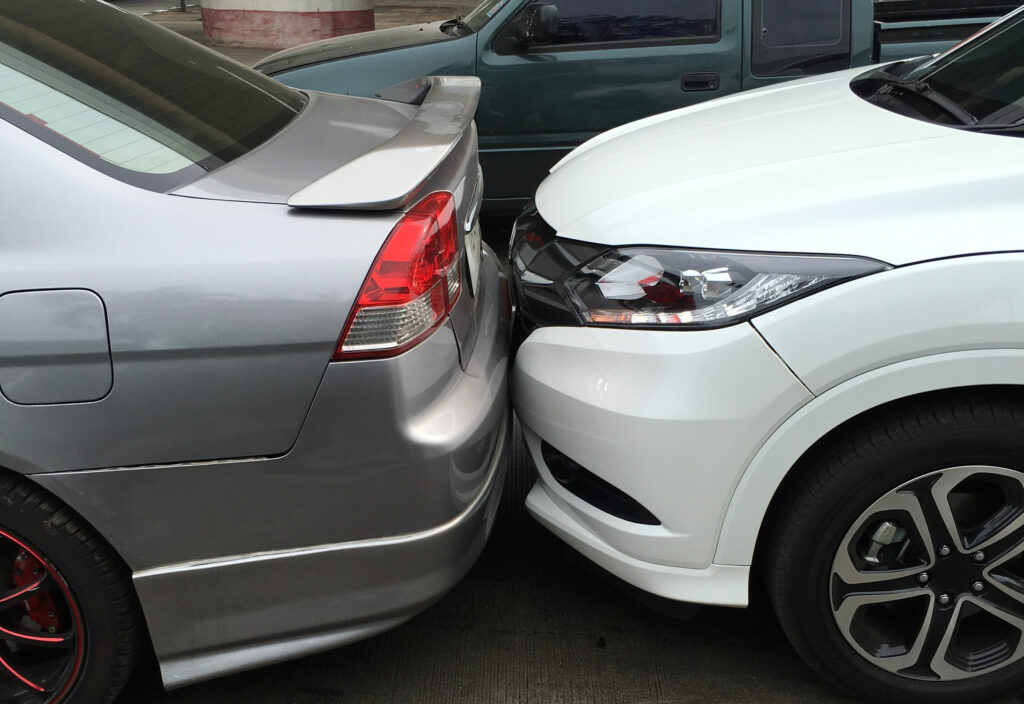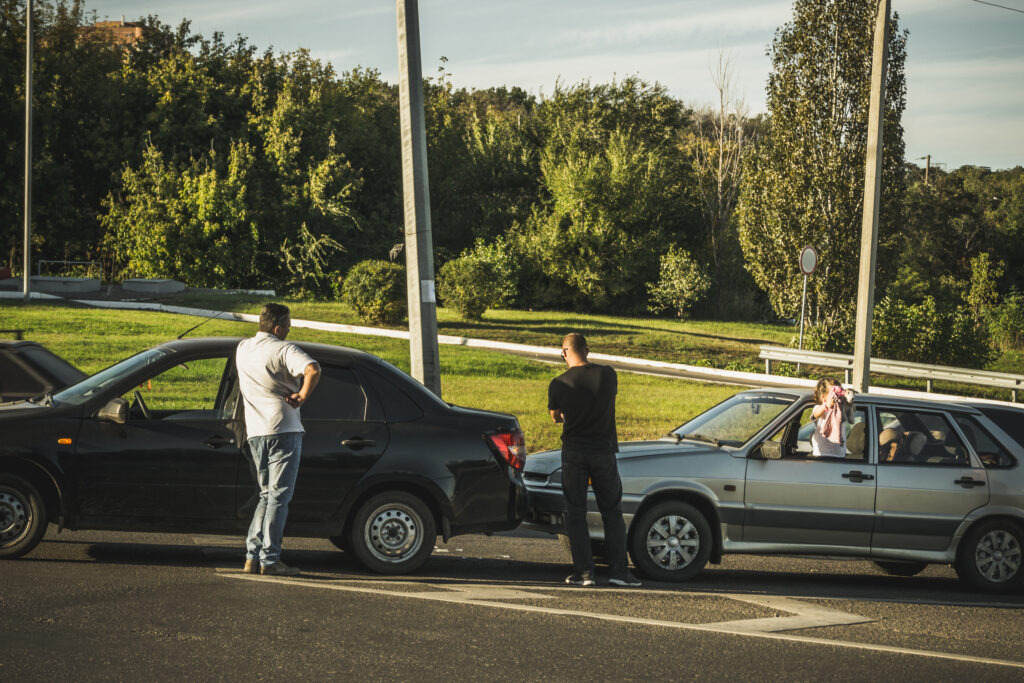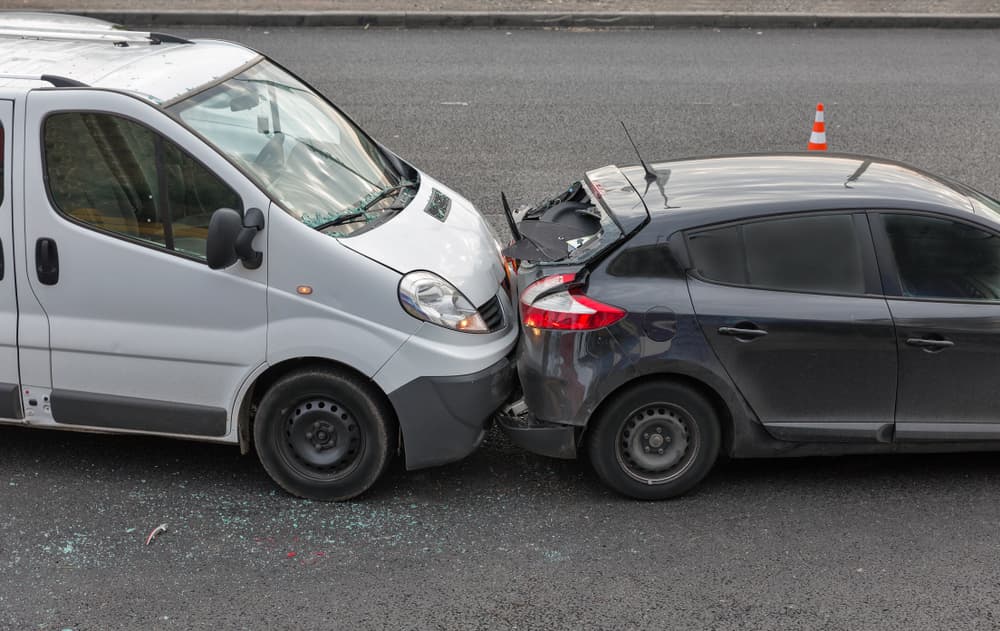A rear-end accident happens when the front of one vehicle strikes the back of another vehicle. Although these accidents may occur anywhere, they are especially common at traffic intersections where a rear driver fails to leave enough stopping distance between their own vehicle and the vehicle in front of them.
These accidents may also occur when a driver breaks the speed limit or fails to pay attention to the road. Therefore, in most instances, the rear driver is at fault in a rear-end accident.

The force of a rear-end collision may cause a driver or passenger on the receiving end to suffer extremely serious injuries. If you sustained injuries in a rear-end car crash, first obtain the medical treatment you need. Then, consult a knowledgeable car accident lawyer in your jurisdiction as soon as possible.
A car accident lawyer in Chicago can meet with you to discuss your accident, gather important documents, and file a claim with the at-fault driver's insurance company if you are eligible to do so. Your lawyer may also negotiate with the insurance company adjuster on your behalf, and if negotiations are not fruitful, file a lawsuit in the state court system for you.
Given the relatively short statute of limitations time frame for a car accident case, always involve a personal injury lawyer as quickly as possible. Your lawyer can immediately enter an appearance in your case and begin pursuing the financial compensation you deserve for your accident-related injuries and losses.
Schedule a Free Initial Consultation Today!
How Do Rear-end Accidents Usually Happen?
Rear-end car accidents can happen when a vehicle is stopped (such as at a traffic intersection while waiting for a light to change) or in motion. In general, these accidents occur when other drivers fail to operate their own vehicles in a safe and careful manner under the circumstances.
One of the most common causes of rear-end car crashes is a driver's failure to follow standard traffic laws.
Some of the most common road-rule violations that lead to rear-end collisions include:
- Excessive speeding, especially when the at-fault driver fails to take weather and traffic conditions into account
- Failing to leave enough stopping distance between the front of one vehicle and the back of another vehicle
- Tailgating another vehicle or following them too closely
- Failing to signal a lane change when switching lanes in traffic.
In addition to common traffic law violations, rear-end accidents may also happen when people drive in a particularly aggressive manner. This type of driving is sometimes called road rage. Many drivers are in a hurry to arrive at their final destination, and they will do just about anything to try to move ahead of slower-moving traffic.
Angry drivers might aggressively honk their horns, tailgate other vehicles, or speed. As a result, they may inadvertently cause their vehicle to hit the back of another vehicle, causing the front vehicle occupants to suffer serious injuries.
Rear-end collisions also commonly happen when people drive while intoxicated. Intoxicated drivers frequently speed, drive in an erratic manner, and tailgate other drivers, all of which may lead to a serious rear-end collision.
At other times, intoxicated drivers may experience limited reflexes and delayed reaction time. Consequently, they may not hit their brakes in time to avoid colliding with the back of another vehicle.
Finally, some rear-end car accidents occur when drivers do not pay attention to the road. Distracted driving frequently involves using a cellular device to read or send a text message, applying makeup or combing one's hair while behind the wheel, disciplining young children, listening to loud music in a vehicle, programming a GPS navigation system, or adjusting the volume on a vehicle's stereo.
When a driver turns their head away from the road to engage in one or more of these activities, they might fail to see the vehicle in front of them, negligently causing a rear-end crash.
If you sustained injuries in a rear-end car accident that a negligent driver caused, you should consult with a car accident lawyer in your area as quickly as possible to explore your legal options. Your lawyer can lay all potential options on the table for you and pick an option that best suits your individual needs and goals.
Injuries That Are Common in Rear-end Car Collisions
Rear-end car accidents may lead to several types of injuries, some of which may be permanent in nature. The force of a rear-end accident often causes the driver or passenger's body to move backward and forward very abruptly, leading to a soft tissue whiplash injury to the neck and back.
Other common injuries that rear-end accident victims might suffer include rib fractures, bone fractures, bruises, open lacerations and cuts, internal organ injuries, spinal cord injuries, paralysis injuries, and mouth or tooth injuries.
The extent of an accident victim's injuries usually depends on the force of the rear-end accident, the number of vehicles involved in the crash, the way in which the accident victim's body moves at the point of impact, and whether or not a part of the accident victim's body strikes the headrest, steering wheel, window, door, or other vehicle component in the accident.
Following a rear-end car accident, it is important that injured drivers and passengers obtain the medical treatment that they need as quickly as possible. For example, they might need to consult a neurologist, orthopedist, physical therapist, or other medical specialist for their injuries. They might also need to undergo serious surgery to fix a broken bone or address another debilitating injury.
While an accident victim receives treatment for their injuries, their car accident attorney can begin gathering the medical documentation and other potential evidence necessary to prove their case and recover monetary damages.
How to Prove a Rear-end Car Accident Claim
To recover monetary compensation as part of a rear-end car accident case, the accident victim must satisfy their legal burden of proof. Everyone has a duty to drive in a prudent, safe, and careful manner, given the prevailing circumstances.
Consequently, people must drive according to all traffic laws and safety regulations. They must also refrain from intoxicated and distracted driving while they are behind the wheel.
An injured accident victim must demonstrate that the other driver did something wrong under the circumstances. For example, they might have broken the speed limit, tailgated, or drove while intoxicated.
Next, the injured car crash victim must establish that the other driver's negligent actions or inactions were both the actual and the foreseeable cause of the rear-end accident. Finally, the accident victim must establish, through medical testimony from an expert, that they suffered at least one physical injury as a direct result of the rear-end crash.
In addition to establishing medical causation in a rear-end car accident claim, a medical expert might show that the accident victim suffered one or more permanent injuries. A knowledgeable car accident lawyer in your area can retain one or more experts who can testify in your case, or draft reports that a judge can admit as evidence at trial.
Recoverable Monetary Damages Following a Rear-end Crash
There is no disputing that rear-end car accidents may lead to extremely serious injuries and losses. For example, an injured car crash victim might need to undergo significant medical treatment that lasts for many weeks or even months.
As a result, they might incur significant medical costs over time. In addition, a rear-end accident victim may not work for a lengthy period of time, resulting in significant lost income.
Fortunately, victims of rear-end car accidents can recover various types of monetary compensation.
First, they may pursue economic damages to compensate them for their out-of-pocket losses. These damages compensate accident victims for past related medical costs, anticipated medical expenses, such as for future surgery or physical therapy, loss of earnings, and loss of earning capacity.
In addition to these economic damages, rear-end car crash victims may pursue compensation for their intangible losses. These damages compensate accident victims for all their related mental distress, lost quality of life, loss of use of a body part, past and anticipated pain and suffering, inconvenience, permanent disability or disfigurement, long-term or lifetime care costs, and loss of spousal consortium and companionship.
Since every rear-end car accident case is different, not all accident victims will be eligible to recover the same types and amounts of monetary damages.
An experienced car accident lawyer in your area can review with you the circumstances of your accident as well as the strengths and weaknesses of your case and develop a ballpark value of your losses.
Your lawyer can also guide you to make important decisions throughout your case, including whether or not to accept a particular settlement offer that the insurance company adjuster puts on the table.

Litigation Options in a Rear-end Car Accident Case
Before filing a lawsuit in the court system on your behalf, your personal injury lawyer can submit a claim with the at-fault party's insurance company. The goal of filing a claim is to receive a favorable settlement offer from the adjuster handling the case.
However, that rarely happens early on in the case. This is because insurance companies do not have a strong incentive to fairly compensate accident victims for their injuries. Instead, they want to keep as much of their money in-house as possible and distribute it to their shareholders.
Many insurance company adjusters will make extremely low settlement offers right off the bat to try to entice the accident victim to resolve their case quickly and cheaply. However, a strong Chicago personal injury lawyer advocating in your corner can negotiate with the adjuster on your behalf, highlight the strengths of your case, and pursue the highest amount of monetary recovery available.
If the insurance company will not compensate you fairly, your lawyer can pursue litigation in court. Many cases still settle at some point during the litigation process. However, if the insurance company still refuses to take your case seriously, you may have several litigation options.
One option is to take your case to a civil jury trial and allow the jury to decide the amount of monetary compensation to award you for your injuries. The other option is to pursue alternative dispute resolution (ADR). Common ADR proceedings include mediation, whereby a mediator facilitates settlement discussions between the parties, and arbitration, whereby a neutral arbitrator listens to the available evidence and decides the issue of monetary damages.
When it comes to choosing a litigation option in your case, you are the ultimate decision-maker. Your lawyer can help you arrive at an informed and intelligent decision about how best to proceed with your legal matter and ultimately maximize your overall monetary award.
Speak with a Car Accident Lawyer Near You Today
If you suffered injuries in a rear-end car accident, time is of the essence. Victims of car crashes only have two years, starting on their accident date, to file a personal injury lawsuit that seeks monetary recovery for their accident-related losses.
In almost all circumstances, if the accident victim fails to file a timely lawsuit in court, they will not be eligible to pursue monetary compensation at a later date.
A skilled car accident attorney can start working on your case right away and begin pursuing the monetary settlement or litigation result you need and deserve.
Throughout the settlement negotiation process, your lawyer can aggressively advocate for your interests and maximize the settlement compensation you receive.
If the insurance company does not take your case seriously, your lawyer can explore litigation options with you and, if necessary, take your case to a civil jury trial or alternative dispute resolution (ADR) proceeding.
While adding legal consultations to your to-do list might seem overwhelming following a serious injury, doing so can actually relieve stress from you. With the right attorney on your side, you do not have to worry about saying the wrong thing to insurers or other missteps that can jeopardize your claim. Consult an attorney as soon as possible to begin protecting your rights and future.



